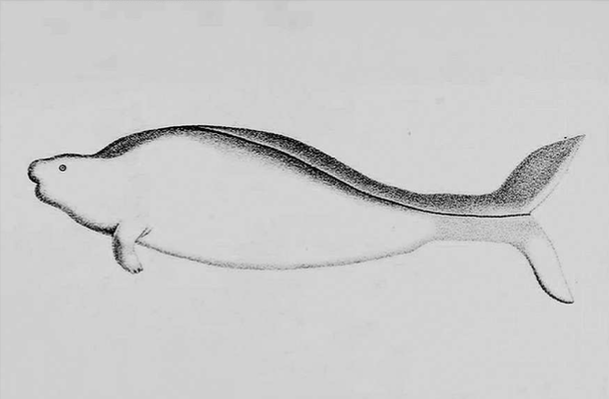Extinct Mermaids. Myth-making in the Anthropocene with Romana Bund, Working Wednesdays
Hybrid
Williams 623 & via Zoom

Image credit: This is one of the earliest depictions of Steller’s sea cow of unclear origin. Published by Simon Peter Pallas in Zoographia Rosso-Asiatica, St. Petersburg, Academiae Scientiarum, Vol. 1, 1831.
Extinct Mermaids. Myth-making in the Anthropocene
Steller's sea cow was first described in Western science by German naturalist Georg Wilhelm Steller in 1741 when shipwrecked in the Northern Pacific Ocean. Only 27 years after it entered natural history, the sea cow was last seen and has since been declared extinct. Its remains can be found as bones and patches of skin in museum collections today. As remnants of colonial flows of knowledge and goods, the remains’ popularity grew alongside an awareness for extinction events and their connection to human activity. Hence, colonial and capitalist expansion not only extinguished the whole species but also recycled the remnants of its exploitation for knowledge and luxury goods.
Steller’s sea cow’s connection to the mermaid myth lies in its scientific classification. It is part of the biological order of the so-called Sirenia, describing aquatic, herbivorous mammals as mermaids and deriving directly from mermaids in Ancient Greek mythology. Focusing on the remains of Steller’s sea cow and its relation to the mermaid myth, I will highlight the animal’s complex entanglements of being within and outside water, between human and animal, fiction and fact. At the same time, I will explore whether the mythical attached to the remains facilitates exposure of Eurocentric knowledge production's violent inscriptions and instrumentalizations, while also enabling different forms of storytelling for mass extinction in the Anthropocene.
Romana Bund is a PhD candidate at the University of Vienna, Austria. She is a member of the Research Platform Mobile Cultures and Societies and part of the PhD program Cultural Mobility Studies, which is funded by the Austrian Science Fund (FWF). Her PhD project is based in the fields of Cultural and German Studies, where she explores the mobility and violent histories of human and non-human remains in Western science beginning with the 19th century. In the spring term of 2023, she is a Visiting PhD Scholar at the Penn Program in Environmental Humanities (PPEH) and Germanic Studies (FIGS) at the University of Pennsylvania.

PPEH offers a lunch series, Working Wednesdays, designed to showcase in-progress Community Based Participatory Research (CBPR) straddling theoretical and practical environmental concerns. These sessions take place on Wednesdays, 12:30-1:30 sharp.
All sessions are open to the Penn community but require RSVP. Grab a lunch and join us in person or on Zoom!
